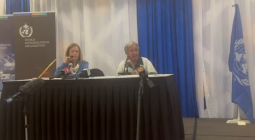The Guardian understands that the signatories to the letter in favour of the phase-out of fossil fuels include: Austria, Belgium, Chile, Colombia, Costa Rica, Croatia, Czechia, Estonia, Finland, France, Germany, Guatemala, Honduras, Iceland, Ireland, Liechtenstein, Luxembourg, the Marshall Islands, Mexico, Monaco, the Netherlands, Panama, Palau, Slovenia, Spain, Sweden, Switzerland, the UK and Vanuatu.
Irene Vélez Torres, the environment minister of Colombia, told the Guardian: “The letter emerged after the presidency presented a ‘take-it-or-leave-it’ text that we believe is insufficient for the level of ambition and implementation this Cop must deliver – particularly regarding the need, clearly backed by science and by people around the world, for a roadmap to phase out fossil fuels.
“This Cop’s success cannot be measured by adopting a text at any cost. The true success of this Cop lies in the quality of the outcome. Adopting a weak or empty text would signal a failure of climate multilateralism and a failure to future generations, who deserve a livable planet.”
Catherine Abreu, the director of the International Climate Politics Hub, said: “It’s clear that a growing group won’t leave Belém without an ambitious package deal built on four cornerstones: money for adaptation, better quality and accountability for climate finance, a clear focus on tackling the biggest sources of climate pollution – fossil fuels and deforestation – and a commitment to drive it all with a just transition.”
She added: “The question is whether the Brazil presidency will choose to listen to them, with time running out.”
The fortnight-long talks in Belém were scheduled to end on Friday evening but have been delayed by the fire – in which no one was hurt but some damage was caused to the venue – and are likely to carry on into the weekend.
As the talks reach their final hours, the row over the transition away from fossil fuels is likely to dominate, but other issues also remain to be resolved, including a response to the fact that countries’ national climate plans are too weak to limit global heating to 1.5C above preindustrial levels as set out in the 2015 Paris agreement, and questions of finance, trade and transparency, and how much cash developing countries will receive to help them adapt to the impacts of the climate crisis.




